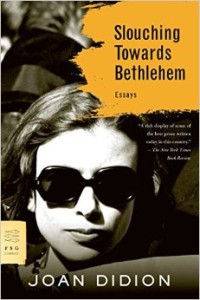I can never cut through the ambiguities and second starts
 Slouching Towards Bethlehem
Slouching Towards Bethlehem
by Joan Didion
I love Joan Didion and had been looking forward to reading this, her most famous work. It did not disappoint. Even her introduction is gorgeously artful, packed with lines I want to write on Post-its on my wall like when I was a teenager.
This book collects together essays Didion wrote between 1961 and 1968. They’re grouped into three sections: “Life styles in the golden land”, all about California, “Personals”, which aren’t really personal but are reflections on a topic, and “Seven places of the mind”, which despite the title are about seven different physical places.
Didion’s sketches of places and people are masterful – and distinctly Didion’s own take. She always takes an unusual angle. For example, her profile of John Wayne is a reconstruction of conversations on the set of one his last films. Her piece on Joan Baez centres around a neighbour’s complaint about Baez’s school, the Institute for the Study of Nonviolence.
“I am comfortable with…those who live outside rather than in, those in whom the sense of dread is so acute that they turn to extreme and doomed commitments; I know something about dread myself, and appreciate the elaborate systems with which some people manage to fill the void, appreciate all the opiates of the people, whether they are as accessible as alcohol and heroin and promiscuity or as hard to come by as faith in God or history.”
I was greatly looking forward to the last essay in the book, the much-lauded classic “Goodbye to all that”, about her decision to leave NYC in the early 1960s, but it actually wasn’t my favourite essay in the book by some way. It’s quite a sad reflection on getting older and wanting different things from life, not really about New York specifically. Except that clearly for Didion when she wrote this, NYC represented her youth.
“It is easy to see the beginnings of things, and harder to see the ends. I can remember now, with a clarity that makes the nerves in the back of my neck constrict, when New York began for me, but I cannot lay my finger upon the moment it ended, can never cut through the ambiguities and second starts and broken resolves to the exact place where the heroine is no longer as optimistic as she once was.”
I did love the “Personals”, such as “On going home”, in which she discusses the small stresses of family life, or “On self-respect”, which, well, the title’s pretty clear what it’s about. But my favourite essay by some way was “On keeping a notebook”. In fact, I’d read excerpts from it before and liked the sound of it so much I wrote a long quote in the back of my diary, where I could refer to it whenever I needed a reminder that I am in some small way like this wonderful woman. The essay is a brilliant exploration of memory, note-keeping and habit.
“Keepers of private notebooks are a different breed altogether, lonely and resistant rearrangers of things, anxious malcontents, children afflicted apparently at birth with some presentiment of loss.”
Didion’s writing is beautiful in an unelaborate, truly original way and I am so happy that I am still near the beginning of discovering all her work.
Published 1968 by Farrar, Straus and Giroux.
Source: Present from my Mum.
Challenges: This counts towards the Classics Club.
I’ve been wanting to read this for a while and just never seem to get around to it!
I really do recommend it. You can always dip in and out of essays, so it could make a good palate-cleanser between other books.